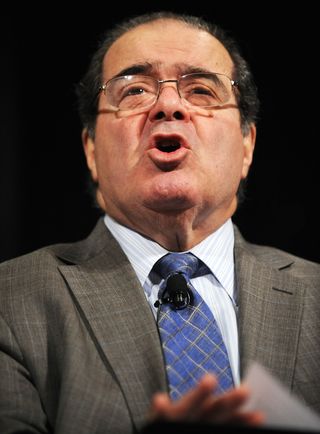On Monday, Duncan Hosie, a gay freshman at Princeton, confronted Supreme Court Justice Antonin Scalia about Scalia’s anti-gay dissents on landmark gay rights cases. This interview with Duncan is worth watching:
Visit NBCNews.com for breaking news, world news, and news about the economy
I’m struck first of all by the freshman’s calm civility and sharp logic. It contrasts so vividly with Scalia’s emotionalism and bravado. When a few of us kick-started this issue way back when, this young man wasn’t even born. Now he articulates the same case with polish, confidence and intellectual clarity. I cannot express how moving that is for me and those who lived through the beginnings of this struggle.
But the exchange also brought back something in my own past. Well over a decade ago (I can’t remember when), one of the professors I taught students for at Harvard, Michael Sandel, invited me to debate my former dissertation adviser, Harvey C Mansfield, on marriage equality. It was for Sandel’s legendarily popular course, “Justice”. The fact that Harvey and I both agreed to do it and debated with civility and mutual respect (I revere Harvey as a scholar and as a human being) was, for me, somewhat moving, if also a little personally awkward.
But at one point, Harvey simply said (I’m paraphrasing), “If we cannot disapprove of homosexuality, then what can we disapprove of?” The huge student crowd – over a thousand in Sanders Theater – audibly gasped. The assumption that homosexuality was obviously a profoundly  immoral and disgusting thing was what separated the generations. I asked Harvey to make an argument that wasn’t based on a mere assumption, that could show why non-procreative sex for a gay couple was somehow obviously abhorrent, while non-procreative sex for a straight couple was completely accepted (i.e. through contraception). He couldn’t. And since that moment, I think it’s fair to say, his position has softened a little (although I don’t want to put words into his mouth).
immoral and disgusting thing was what separated the generations. I asked Harvey to make an argument that wasn’t based on a mere assumption, that could show why non-procreative sex for a gay couple was somehow obviously abhorrent, while non-procreative sex for a straight couple was completely accepted (i.e. through contraception). He couldn’t. And since that moment, I think it’s fair to say, his position has softened a little (although I don’t want to put words into his mouth).
The equation of homosexuals and murderers is also, it seems to me, not so much offensive as bizarre. Let’s say, for the sake of argument, that same-sex non-procreative sex acts are as bad as murders. I know that’s completely insane, but bear with me. Murderers still have the core constitutional right to marry the person they love. Even people on death row who cannot even consummate a marriage because they are incarcerated retain the core right to marry, according to Supreme Court precedent. Dead-beat fathers who have abandoned children from previous marriages and failed to provide child support equally retain a constitutional right to re-marry as often as they wish (also ruled on by SCOTUS). All these rights have been upheld strongly by the Supreme Court over the decades (for the precise precedents, check out my anthology, Same-Sex Marriage, Pro and Con).
So lets challenge Scalia on “legislating morals”. The public has every right to legislate morals but not to do so arbitrarily to punish and stigmatize a minority for doing the exact same things that the majority does all the time, i.e., sodomy. If the court has already determined that mass murderers have an inviolable right to marry, how is allowing gay people to marry somehow a sign of moral decline? If the court has already made non-procreative sex constitutionally protected for straight people, how is it that the very same thing, condemned for the very same reasons by Scalia’s and my own hierarchy, is obviously immoral when it comes to homosexuals?
It’s that discrepancy that suggests that this argument is not about legislating morals, as Scalia insists. It is about legislating them unequally, and treating a tiny minority differently for no rational reason. This issue has been settled, as Scalia himself declared in his dissent in Lawrence vs Texas. He rightly said there that that decision essentially made gay marriage a constitutional inevitability. He was right. And he should uphold that precedent in these cases, if it comes to that. Or is he going to contradict himself?
Amy Davidson puts Scalia’s backwardness in perspective:
It was during the AIDS crisis that many people learned what it meant to be married, in terms of having the right to be in a hospital room or plan a funeral, and also how many people they knew who were touched by it. Those lessons, about the legal power of marriage and the enduring force of family ties, have been carried past those years of crisis. They have been joined by, and informed, a drive for marriage as a way to protect the rights of the children of gay parents.
Scalia has no awareness of this, as he is sealed off from it entirely. Paul Campos uses the incident to argue for SCOTUS term limits:
Scalia’s tactless fulminations are, at bottom, a reminder of why life tenure for Supremes is a bad idea, the badness of which increases in direct proportion to our average life expectancy. Put another way, someone who was in law school at a time when 96 percent of the public disapproved of interracial marriage should be considered too old to sit on the Supreme Court.
(Photo: US Supreme Court Justice Antonin Scalia speaks during the American Bar Association 59th annual ‘Antitrust Law Spring’ meeting in Washington, DC, on March 31, 2011. By Jewel Samad/AFP/Getty Images.)